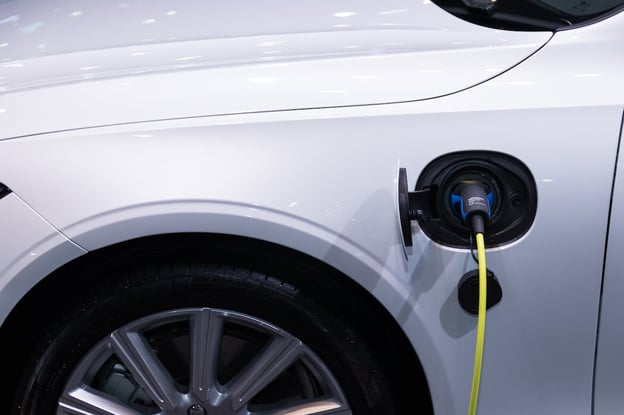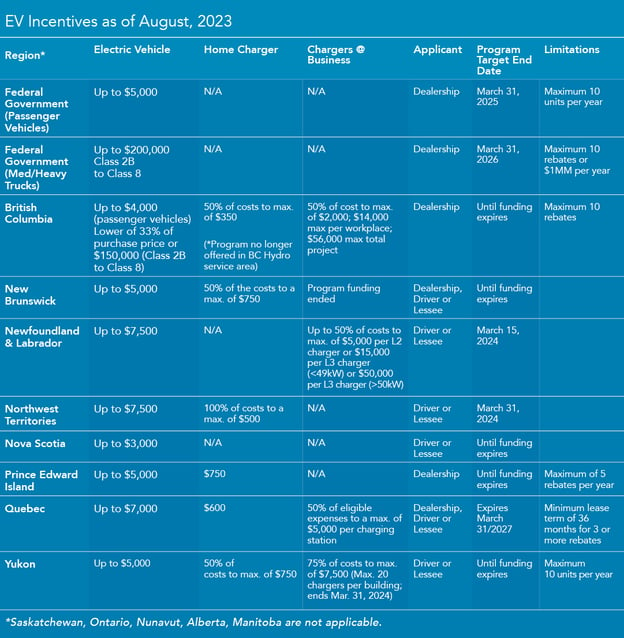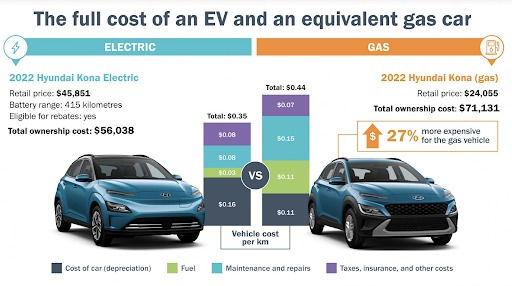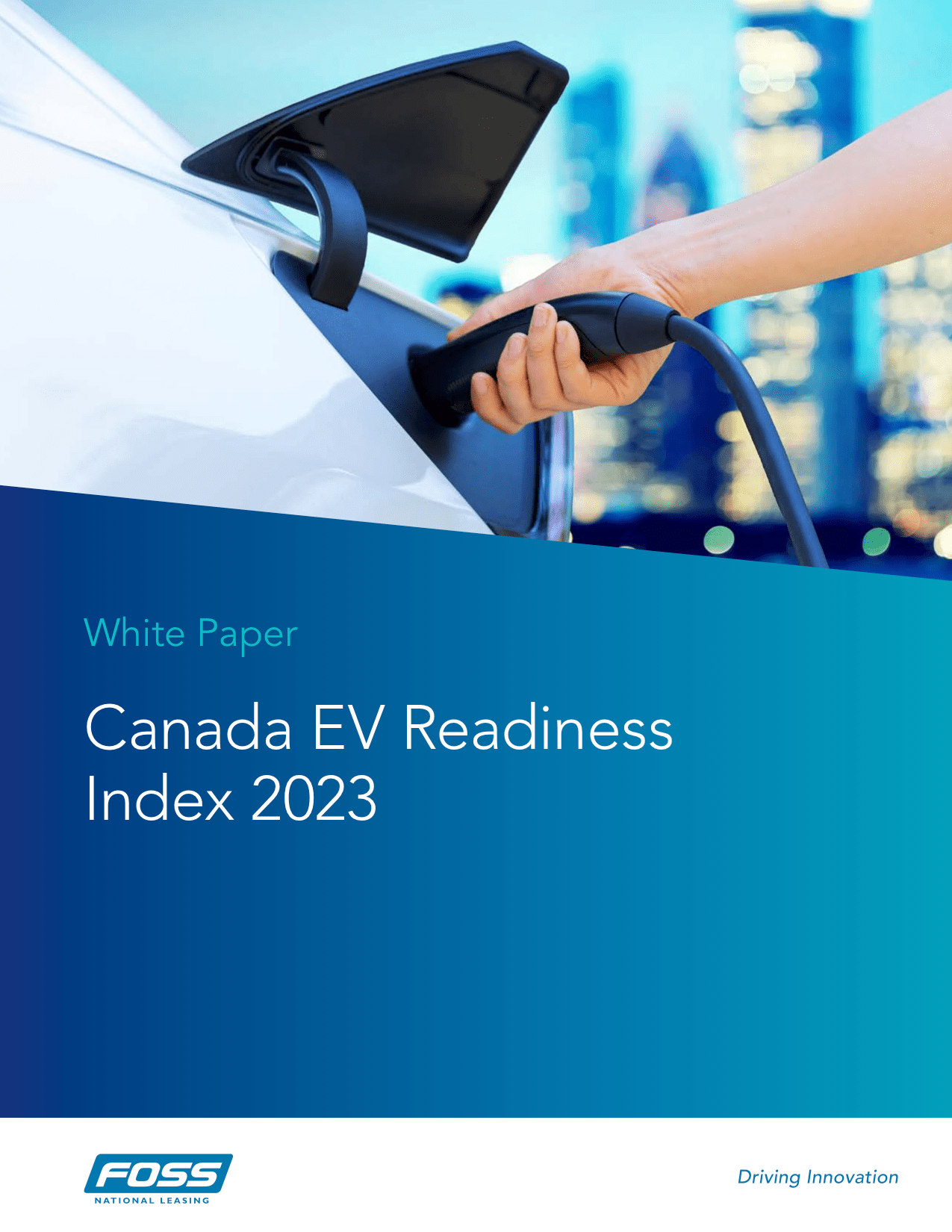
Considering electric vehicles for your fleet, but worried about the cost? We’ve got some good news for you.
Considering electric vehicles for your fleet, but worried about the cost?
We’ve got some good news for you:
The federal government offers key incentives that make EVs more accessible for individuals and businesses across Canada.
In this blog, we’ll share details about the incentives, and how EVs may be able to lower overall fleet costs.
What do EV incentives mean for your fleet?
The federal government has the following targets in place to increase EV sales across the country:
- By 2026, 20% of total vehicle sales should be zero-emission
- By 2030, 60% should be zero-emission
- By 2035, 100% should be zero-emission
Currently, EV purchase prices in Canada range from $33,000 all the way up to $156,000 for more luxury models. Thankfully, there are many quality EVs available on the lower end of the cost spectrum, making them a more practical investment for businesses—especially when you take the available incentives into account.

3 Key Incentives to Speed Up EV Adoption Across Canada
1. Rebates To Reduce EV Purchase Price
1.1 Federal programs
The federal government’s Incentive for Zero Emission Vehicles Program (iZEV) offers up to $5000 for battery electric or hydrogen fuel cell vehicles and up to $2500 for plug-in hybrid vehicles.
However, there are limits on the manufacturer’s suggested retail price (MSRP):
For passenger cars, the base model is eligible if it costs less than $55,000 MSRP, while higher trim levels can get up to $65,000 MSRP.
For light-duty vehicles like pickup trucks, SUVs, and minivans, the base model is eligible if it costs less than $60,000 MSRP, while higher trim levels can get up to $70,000 MSRP.
The federal government of Canada launched the Medium- and Heavy-Duty Zero-Emission Vehicles (iMHZEV) Program in July 2022. This program offers incentives of up to $200,000 for Class 7/8 Coach Bus, Class 8 FCEVs (e.g., coach buses), and smaller sums for other vehicle classes to encourage the adoption of zero-emission vehicles in the medium- and heavy-duty transportation sector.
Please note that there is a maximum allowance of 10 rebates per calendar year, and a cap of one million dollars, which encompasses both the iZEV and iMHZEV programs combined.
1.2 Provincial programs
Additionally, businesses can stack this federal EV incentive with provincial programs. The provinces of British Columbia and Quebec offer a more comprehensive set of EV incentives.
As part of the BC EV incentive, you can receive:
- Up to $4,000 for the purchase or lease of a new battery electric vehicle (BEV) or extended-range (ER)-EV.
- Up to $2,000 for the purchase or lease of a new plug-in hybrid electric vehicle (PHEV).
- Up to $4,000 for the purchase or lease of a hydrogen fuel-cell vehicle (FCEV).
- Up to $6,000 for a new EV + $300 in cash when you scrap your current gas or diesel vehicle through the Scrap-It program.
- Cars (including two seaters, compacts, mid-sizes, and large cars) with an MSRP of more than $55,000 are not eligible for the incentive. Larger vehicles with an MSRP of more than $70,000 are not eligible.
- Rebates are available for special-use vehicles, such as medium and heavy-duty vehicles, providing a maximum amount of $150,000 or 33% of the purchase price, whichever is lower. This program was previously known as SUVI, but it now falls under the Clean BC Go Electric program.
In Quebec, you can receive:
- a purchase or lease rebate of up to $7,000 for a new eligible battery or fuel cell electric vehicle.
- depending on the type of vehicle, up to $5,000 or $2,500 for a plug-in hybrid electric vehicle.
- up to a $600 rebate for installing a home-charging station.
- up to a $5,000 rebate for installing a workplace charging station.
- up to a $3500 rebate for purchasing an eligible used all-electric vehicle.
*Note that, for fleets in which a customer applies for three or more incentives within a calendar year, there is a minimum requirement that the vehicle be registered in the Province of Quebec for a minimum of 36 months.
This opportunity to combine provincial and federal incentives results in significant cost savings for many businesses adding EVs to their fleets.
Currently, all provinces except Ontario are offering provincial incentive programs.
Federal and provincial EV purchase rebate 2023

2. Tax Credit on EV Purchases
Canada’s federal EV incentive allows businesses to fully deduct the capital costs of zero-emission vehicles (ZEVs), up to a maximum of $55,000 in the first year of investment.
Of all the EV initiatives in Canada, this rebate is most likely to affect your business directly, aiming to encourage more businesses to convert to zero-emission fleets.
3. Expansion of EV Charging Infrastructure
As of August 2023, there are 17,224 publicly-accessible EV chargers across Canada, at 6,736 charging sites. As highlighted during EV Week in Canada, the federal government is deploying charging infrastructure from coast to coast to coast, with the goal of supporting 84,500 new chargers across Canada by 2027.
This means that drivers will be able to charge or fuel up more conveniently, easing range anxiety and fears of being stranded.

The cost implications of EV’s
The cost implications of electric vehicles (EVs) can vary based on several factors, and predicting the total cost of ownership (TCO) can indeed be complex due to various evolving elements. Here are the key points to consider regarding the cost implications of EVs:
1. Electricity Costs
The cost of electricity is a significant factor in the TCO of an EV. The future trajectory of electricity prices can impact the cost-effectiveness of owning and operating an EV. It's important to consider how electricity costs may change over the life of the vehicle. Currently, even amidst high electricity costs, electricity still costs less than gasoline.

Chart source: GlobalPertrolPrices.com
In addition, the federal carbon tax, originally introduced in April 2019, was updated in November of 2022 to increase to a total of $170 per tonne by 2030. Under today’s level of carbon taxation, Canadians pay about an extra 6.5 cents per litre of gasoline, but this is set to rise to an extra 1.5 cents per litre in 2024.
Read more: 6 Common Electric Vehicle Myths Debunked
2. Charging Penalties
Penalties for extended use of public or condo office charging stations could increase the operational costs of an EV. Understanding and accounting for potential penalties is essential when calculating the TCO of an EV.
3. Insurance Costs
Insurance premiums for EVs can be influenced by factors like the cost of repairs, replacement parts, and the overall safety record of the vehicle. Uncertainty in how insurance companies will assess and price EV policies can affect TCO calculations. 2. Some companies, such as Aviva, Desjardins, and others, offer “green car discounts” for EV and hybrid vehicles. Residual Value:
The evolving technology in the EV market can impact the residual value of current EVs as newer and more advanced models become available. Potential depreciation due to technological advancements should be considered when estimating the long-term costs of ownership.
4. Maintenance and Repair Costs
Generally, EVs have lower maintenance and repair costs compared to traditional internal combustion engine vehicles. With no oil to change or valves, gaskets, and spark plugs to repair, EVs are surprisingly low maintenance. They also rely on a regenerative braking system, which reduces brake pad wear. This means less frequent replacements, leading to lower costs. However, the specifics can vary based on the make and model of the EV and evolving repair technologies.

Chart source: Environmental Journal
5. Charging Infrastructure Development:
The expansion and improvement of charging infrastructure can influence the convenience and cost of charging an EV. Future developments in this area may impact TCO calculations.
Higher costs to be aware of
While there are many cost savings benefits associated with EVs, in some areas costs are higher. This, of course, includes the purchase price, which is partially offset by the incentives we mentioned above. The evolving technology in the EV market can impact the residual value of current EVs as newer and more advanced models become available. Potential depreciation due to technological advancements should be considered when estimating the long-term costs of ownership.
The higher purchase or lease cost of an electric vehicle could increase the standby charge part of the taxable benefit calculation. Currently, the operating costs of the taxable benefit calculation do not adjust because there is no gas. The driver is still responsible for the full 33 cents per personal KM.
Conclusion
Adding EVs to your fleet has never been more affordable, thanks to the available incentives to buy electric cars in Canada. EVs also provide a lower total cost of ownership and can help promote a sustainable image for your company. And while some costs associated with EVs may be higher, their many benefits mean they’re still a viable option for many fleets across Canada.
Get to Know the Author
Glenn Provan has over 27 years of experience working in the fleet management industry. Over the years he has held many different roles in Operations, Finance, and Management.
Having a mind for “numbers” and being analytical by nature, Glenn utilizes his industry experience to allow Foss National Leasing’s sales team and their customers to make data-driven decisions about how they manage their fleet and identify opportunities to make changes to reduce costs, improve efficiencies, and increase driver satisfaction.
Glenn is passionate about the industry and enjoys learning new things. Outside of the office, he enjoys spending time with his family and watching good movies.
Meet our team






